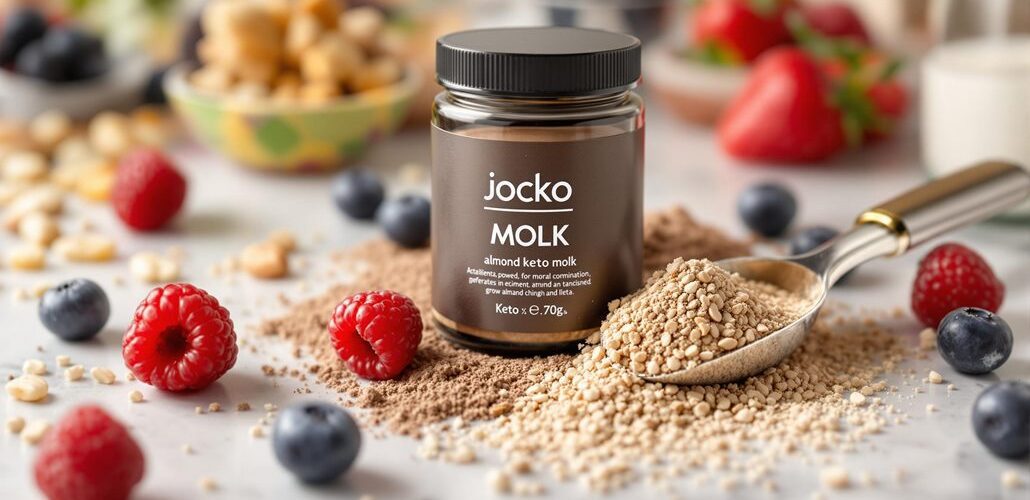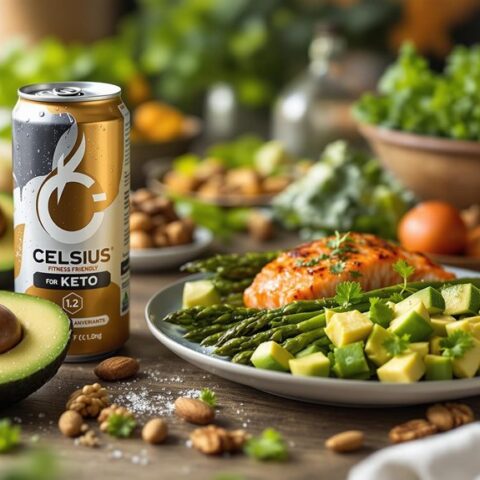
Jocko Molk is a protein supplement featuring a blend of whey protein, egg albumin, and micellar casein, designed to support muscle recovery with 22 grams of protein and digestive enzymes for improved absorption. It includes natural ingredients such as monk fruit extract and excludes artificial sweeteners. However, its claims of grass-fed protein lack transparency and third-party verification, potentially affecting ingredient quality assurance. Users may experience digestive benefits but should be mindful of potential side effects, such as allergenicity. Evaluating its nutrient content and transparency issues is paramount for consumers considering its benefits for dietary and muscle-support needs.
Key Takeaways
- Jocko Molk provides 22 grams of protein per serving, supporting muscle recovery and growth.
- It includes digestive enzymes for improved nutrient absorption and lactose intolerance support.
- The product is free from artificial sweeteners, using natural flavors and monk fruit extract.
- Transparency concerns exist regarding grass-fed protein claims and sourcing authenticity.
- Potential side effects include digestive discomfort and allergenicity; moderation and professional consultation are advised.
Product Composition and Ingredients
The composition of Jocko Molk embodies a strategic blend of protein sources designed for ideal muscle recovery. This multi-blend protein powder incorporates whey protein concentrate, whey protein isolate, egg albumin, and micellar casein, delivering varied absorption rates essential for sustained muscle repair. Each serving provides around 22 grams of protein, enriched with 3 grams of leucine to bolster Muscle Protein Synthesis (MPS), a core function in muscle growth and recovery.
Additionally, the protein content aligns with recommendations for protein optimization, ensuring satiety and supporting muscle maintenance during ketosis.
An examination of the ingredient list reveals a commitment to simplicity and naturalness, featuring natural flavors, xanthan gum, monk fruit extract, and red beet powder for color. Significantly absent are artificial sweeteners, highlighting a preference for a cleaner product profile.
The inclusion of digestive enzymes, specifically protease and lactase, enhances nutrient absorption and offers support for those with lactose intolerance, facilitating better utilization of the protein sources.
The product claims to use grass-fed protein, but the transparency of these assertions remains unclear, leaving room for scrutiny regarding the authenticity of the sourcing.
Health Benefits and Risks
Jocko Molk offers distinct health benefits, particularly in supporting muscle recovery due to its high protein content and inclusion of leucine, a critical amino acid for muscle repair.
Additionally, the formulation's digestive enzymes may enhance digestive health, reducing discomfort for those with lactose intolerance.
However, it's important to note that nutrient deficiencies can occur on restrictive diets, so individuals should guarantee a balanced intake of vitamins and minerals.
Potential side effects, such as digestive discomfort and allergenicity, underscore the necessity for individuals to consult healthcare professionals, especially if they have sensitivities or are considering long-term use.
Muscle Recovery Support
Muscle recovery is an essential component of any fitness regimen, and effective nutritional support can greatly enhance this process. Jocko Molk's protein supplement is formulated to aid muscle recovery and growth by providing approximately 22 grams of protein per scoop. A recommended intake of 1.3 scoops post-workout is designed to stimulate muscle protein synthesis (MPS) effectively.
The protein profile, combining fast-digesting whey with slow-digesting micellar casein, guarantees a sustained release of amino acids, which is beneficial for the recovery process after intense workouts. The inclusion of 3 grams of leucine per serving aligns with the recommended leucine intake for ideal muscle recovery and growth, highlighting its strategic formulation.
Additionally, the blend of digestive enzymes may alleviate digestive issues related to protein consumption, enhancing overall protein absorption for individuals, including those who are lactose intolerant.
However, despite these potential benefits, concerns have been raised about the protein quality and sourcing transparency of Jocko Molk. These factors may pose risks to long-term health, emphasizing the importance for consumers to carefully weigh these aspects when considering its use for muscle recovery support.
Balancing the benefits with potential concerns is vital for informed decision-making.
Digestive Health Considerations
In evaluating Jocko Molk's impact on digestive health, its incorporation of digestive enzymes such as protease, lactase, and lipase emerges as a strategic component, potentially mitigating common side effects like bloating and discomfort, particularly for lactose-intolerant users. These enzymes aid in breaking down proteins and lactose, enhancing the digestibility of the quality protein found in this supplement. This approach is beneficial for those who frequently experience digestive issues with other protein powders.
The blend of whey protein and micellar casein in Jocko Molk provides a sustained release of amino acids, which is advantageous for muscle recovery and digestive comfort post-exercise. However, it's essential to take into account that undisclosed lactose levels may still pose challenges for individuals with severe lactose intolerance or sensitivity to dairy, necessitating caution.
While users report minimal bloating, suggesting effectiveness in promoting digestive health, the presence of artificial sweeteners may present potential allergens and digestive risks. These additives could counteract the intended health benefits for some consumers, emphasizing the importance of scrutinizing ingredient lists.
Potential Side Effects
While Jocko Molk's formulation aims to enhance digestive health with the inclusion of digestive enzymes, it is also important to contemplate the potential side effects associated with its consumption.
These enzymes are designed to reduce digestive discomfort, such as bloating, especially for lactose-intolerant individuals. However, some users may still experience digestive issues due to the protein types used, including dairy and egg proteins, which are common allergens. Consequently, those with sensitivities should carefully review product labels to understand the potential risks.
In addition to digestive concerns, the safety of Jocko Molk is questioned regarding heavy metal contamination, particularly as the product lacks third-party testing. Such testing is essential to affirm the product's purity and safety, as heavy metals can pose significant health risks if accumulated in the body over time.
Furthermore, excessive consumption of protein supplements might lead to mood disorders, impaired cognitive function, or even organ damage. Hence, moderation and adherence to recommended dosages are imperative.
Ultimately, while Jocko Molk offers nutritional benefits, consumers must weigh these against potential side effects, ensuring informed decisions based on personal health needs and safety considerations.
Protein Quality Concerns
Jocko Molk's protein formulation has garnered attention due to concerns surrounding its actual protein quality, particularly given the blend's inclusion of whey protein concentrate, isolate, egg albumin, and micellar casein.
One primary issue is the discrepancy in protein per serving, attributed to a larger scoop size that may mislead consumers about the true protein content. Despite being marketed as containing grass-fed whey, there is insufficient clarity on sourcing, and the amino acids profile lacks full support for these claims. This ambiguity can affect consumer trust regarding the product's purported benefits.
Moreover, the absence of third-party certification raises further questions about the accuracy of ingredient listings and overall protein quality. Such certification is essential for validating claims and ensuring that the product meets industry standards.
Although the inclusion of digestive enzymes aims to enhance absorption and mitigate bloating, their effectiveness can be compromised if the actual protein quality is not as advertised.
Additionally, the time-released protein profile is challenged by digestion studies indicating rapid absorption within an hour. This potential mismatch between marketing claims and product performance necessitates scrutiny, urging consumers to reflect on these factors when evaluating Jocko Molk's nutritional value.
Grass-Fed Claims Analysis
The packaging evolution of Jocko Molk serves as a tangible symbol of the ongoing debate surrounding its grass-fed claims. Initially, the product prominently featured grass-fed whey, suggesting a premium protein blend with potentially higher levels of beneficial amino acids, such as branched-chain amino acids (BCAAs).
However, recent formulations have omitted this detail, raising concerns about sourcing transparency and the authenticity of the grass-fed label. This shift necessitates a careful claims analysis to discern the true nutritional value offered by Jocko Molk.
Key considerations include:
- Grass-fed whey may enhance amino acid profiles, but clarity is lacking.
- Sourcing transparency is essential, yet current labeling falls short.
- The absence of third-party certification limits claim verification.
- Changing formulations suggest possible inconsistencies over time.
- Consumer caution is advised due to potential discrepancies in claims.
The implications of these factors are significant. Without third-party certification to substantiate grass-fed assertions, the integrity of Jocko Molk's protein blend remains uncertain.
Consumers seeking genuine grass-fed benefits might find the current amino acid profile unconvincing. Therefore, understanding the nuances of these claims is critical for informed decision-making regarding the overall health benefits of Jocko Molk.
Dietary Considerations
As the authenticity of grass-fed claims raises questions about Jocko Molk's nutritional integrity, it becomes equally important to examine the product through the lens of dietary considerations.
Jocko Molk is formulated with the inclusion of digestive enzymes, an intentional measure to support individuals with lactose intolerance. This addition potentially mitigates the discomfort often associated with lactose in protein blends, thereby expanding its usability for those sensitive to lactose.
Furthermore, the formula's high-fat content can enhance meal enjoyment and maintain fullness, which is beneficial for individuals following a keto diet. Additionally, the presence of egg albumin in the formula caters to lactose-intolerant consumers who incorporate egg proteins into their diets, offering an alternative source of high-quality protein.
Nonetheless, individuals with dietary restrictions must exercise caution, particularly due to the presence of dairy and egg proteins, which are common allergens.
Clear labeling of lactose content is vital, as undisclosed levels may lead to digestive distress for sensitive individuals. For those with dietary sensitivities or restrictions, it is advisable to begin with small doses of Jocko Molk to ascertain personal tolerance levels before increasing intake.
This approach guarantees that the nutritional benefits do not come at the expense of gastrointestinal discomfort, thereby aligning with a balanced dietary regimen.
Consumer Transparency Issues
The transparency of Jocko Molk's ingredient labeling, particularly regarding its grass-fed protein claims, is a topic of concern due to the lack of verification and third-party certification.
This raises questions about the accuracy of its purported nutritional benefits and whether consumers are provided with reliable information about the product's composition.
Ensuring clarity in labeling and substantiating claims with credible evidence are essential for consumers to make informed decisions about their dietary choices.
Ingredient Labeling Clarity
Ingredient labeling clarity frequently serves as a crucial factor for consumers seeking transparency and assurance in the products they choose. Jocko Molk, however, raises transparency concerns due to several labeling issues. The inclusion of an amino acid profile on its packaging aims to inform consumers about its protein content.
Nevertheless, potential amino spiking could mislead perceptions of quality, thereby complicating informed choices. Additionally, the absence of third-party certification or seals of approval further undermines confidence in the accuracy of ingredient details, challenging consumers' ability to trust the product's claimed benefits.
Moreover, Jocko Molk's ingredient list poses additional transparency concerns by not adequately addressing allergens and additives. While digestive enzymes are included to support lactose intolerance, undisclosed lactose levels could still pose risks for sensitive individuals.
The lack of explicit information prevents consumers from accurately evaluating the product's suitability for their dietary needs.
Key considerations for consumers include:
- Amino acid profile: Potential for misleading due to amino spiking.
- Third-party certification: Absence affects trust in ingredient accuracy.
- Allergens and additives: Incomplete disclosure for sensitive consumers.
- Lactose content: Undisclosed levels may cause discomfort.
- Informed choices: Hindered by unclear labeling.
These factors underscore the significance of ingredient labeling clarity for making informed choices regarding Jocko Molk.
Grass-Fed Protein Claims
Jocko Molk's grass-fed protein claims, once prominently displayed, have become a point of contention for consumers seeking transparency in protein sourcing. Initially highlighted on the packaging, the absence of this label in newer formulations has raised eyebrows, especially for consumers prioritizing grass-fed protein for its reputed benefits, such as a superior amino acid profile and higher levels of branched-chain amino acids (BCAAs).
However, Jocko Molk's current amino acid profile does not sufficiently corroborate the claims of being 100% grass-fed, leading to questions regarding the authenticity and quality of the protein used.
The lack of third-party certification or seals of approval further undermines consumer confidence. Without such verification, the claims of responsibly sourced ingredients remain unsubstantiated, leaving the product's transparency in doubt.
This absence of clarity regarding the exact sourcing of the protein raises concerns about the overall quality and authenticity of the ingredients. Consumers may feel misled by the vague claims surrounding grass-fed sources, as there is no clear information regarding the actual proportions or origins of the protein used.
This situation underscores the importance of product transparency to maintain consumer trust in the competitive protein supplement market.
Alternatives and Comparisons
When evaluating protein supplements, alternatives to Jocko Molk such as Alani Nu and MyProtein's The Whey stand out for their affordability and frequent discounts, making them appealing options for budget-conscious consumers.
These alternatives offer a competitive edge in various aspects such as protein release timing, flavor variety, and third-party certification. For instance, Dymatize ISO 100 is recognized for its quick digestion and high-quality whey protein isolate, appealing to those who prioritize rapid recovery, contrasting Jocko Molk's blended protein sources.
Ghost Protein Powder excels in flavor variety and transparency, offering clear labeling that provides peace of mind regarding ingredient composition. This transparency is often missing in Jocko Molk, raising concerns about the accuracy of its ingredient claims due to the absence of third-party certification.
Additionally, Pure Choice Farms caters to individuals with lactose intolerance through its nearly lactose-free formulation and robust amino acid profile, an aspect where Jocko Molk may fall short with undisclosed lactose levels.
- Alani Nu and MyProtein's The Whey: Affordable with frequent discounts
- Dymatize ISO 100: Quick digestion, high-quality protein
- Ghost Protein Powder: Transparent labeling, excellent taste
- Pure Choice Farms: Nearly lactose-free, robust amino acid profile
- Jocko Molk: Lacks third-party certification, ambiguous ingredient claims
Frequently Asked Questions
Is Jocko Protein High Quality?
The quality of Jocko protein is debated due to unclear protein sourcing and ingredient transparency. While it offers nutritional benefits for varied dietary preferences and fitness goals, taste comparisons and leucine content may not meet some expectations.
Is Jocko Fuel Clean?
Jocko Fuel's clean ingredients offer nutritional benefits, supported by natural energy sources. The taste profile receives mixed consumer reviews. Despite beneficial aspects, concerns about dietary compatibility, ingredient transparency, and third-party verification persist, necessitating further evidence for thorough evaluation.
Is Jocko Fuel Good?
Jocko Fuel's benefits include diverse flavors and ingredients, with reviews highlighting effective nutrition. Comparisons emphasize its thorough protein blend, although some critiques note cost and serving size discrepancies. Its nutrition supports muscle recovery, but effectiveness varies among users.
Who Is the Owner of Jocko Mölk?
Jocko Molk, a protein supplement known for its quality ingredients and diverse flavors, is founded by Jocko Willink. Reviews often highlight its benefits for fitness enthusiasts. Comparisons with other supplements emphasize its commitment to transparency and performance-oriented formulation.
Conclusion
Jocko Mölk, a protein supplement, presents a composition that includes various nutrients, promoting potential health benefits. However, concerns arise regarding protein quality, particularly in relation to the product's grass-fed claims. Transparency issues in ingredient sourcing and labeling warrant caution. While Jocko Mölk may serve as a viable dietary option for protein intake, consumers should critically evaluate its nutritional profile against personal dietary needs and consider alternative protein sources to guarantee a balanced and effective supplementation strategy.










No Comments